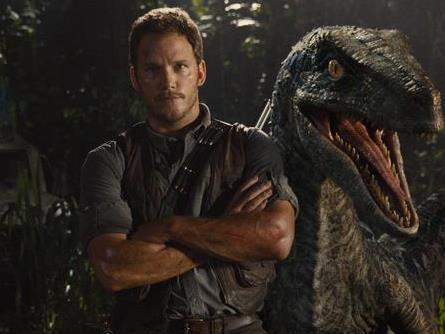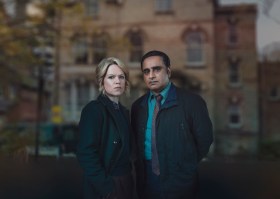Image: www.jurassicworldmovie.com.au
If Jurassic World inspires discussion on a particular topic, that dialogue would have to concern the old and the new. Then versus now and the past versus the present are relevant to several levels of th feature – and not just in the sometimes hulking, sometimes jumping organisms that have become synonymous with the term ancient, and their evident mismatch with our current-day society and environment – in other words, the basis for the feature’s narrative.
Off screen, that conversation resounds in a film series first started in 1993 as Jurassic Park, then continued in two sequels – 1997’s The Lost World and 2001’s Jurassic Park III – before returning with its latest instalment. Twenty-two years ago, the Steven Spielberg-directed effort re-invented the creature feature as a box-office-busting family adventure that gave frightening context to science overstepping nature’s bounds, and set a high standard for its successors. His shadow looms over the franchise’s return, alongside the inevitable questioning aimed at all reignited content: whether it is necessary, whether going bigger is better, and whether modernisations suit the material.
On screen, the same lines of thought also rear their heads, often voiced by the characters. Writer/director Colin Trevorrow and his Safety Not Guaranteed co-scribe Derek Connolly, reworking a screenplay first drafted by Rise of the Planet of the Apes‘, don’t shy away from acknowledging the relationship between their shiny incarnation and its predecessors. Indeed, their entire story encapsulates their contrast several times over. A new, larger park does everything it can to attract wider audiences, including engineer new, scary creatures.
That marketing push and commercial mindset is Claire Dearing’s (Bryce Dallas Howard, 50/50) domain, as operations manager of Jurassic World on Isla Nublar in Costa Rica. As she tells the park’s owner, Simon Masrani (Irrfan Khan, The Lunchbox), business still booms enough to see upwards of 20,000 patrons inside the gates at any one time, but remaining an attractive destination for attendees is an ever-present worry. Enter the Indominus Rex, a genetically manufactured dinosaur designed to wow both adults and children. Splicing pieces of other critters together might make for something suitably different; however it also makes for an unpredictable outcome. Here, as disapproving raptor trainer Owen Grady (Chris Pratt, Guardians of the Galaxy) predicts, it manifests in a bloodthirsty predator terrorising customers – including Claire’s visiting nephews, Zach (Nick Robinson, The Kings of Summer) and Gray (Ty Simpkins, Insidious: Chapter 2).
Of course, the cobbling together of well-worn parts with fresh components that leads to the Indominus’ path of destruction also echoes throughout the tonally lurching film itself; for all its original versus revamped debate, Jurassic World is indeed an effort predicated on acquainted elements given a fresh coat of cinema paint. That’s what the feature’s characters asked for, after all, as did audiences. Under Spielberg’s guiding hand as executive producer, Trevorrow has crafted a sequel that endeavours, above all else, to remain faithful to the fold it has sprung from, with the same narrative beats, character types, mirrored shots and scenarios, and recognisable theme sprinkled throughout.
Such reverence leaves the feature both warmly familiar and somewhat lacking, reaching for the heights of the original while never quite reaching them. Surprisingly for an effort so entrenched in a more-is-more mantra, including a fancier park and animals of larger size, the sense of scale doesn’t transfer either emotionally nor visually. The former is a result of flimsy characters, though not thin performances; the dinosaurs are afforded more personality than their human counterparts, but the actors – the ever-engaging Pratt, and the comic relief provided by Jake Johnson (Let’s Be Cops), in particular – play to their strengths. The latter looks the part, brightening up its world of lumbering creatures and bringing a late-game monster mash clearly influenced by creature battles and disaster epics both old and new, yet simply can’t elicit the requisite jaw-dropping wonder in today’s special effects-heavy movie realm.
That’s not to say that Jurassic World doesn’t offer an enjoyable rehash, or a fun return to the prehistoric beasts that will always fascinate viewers. It’s also not to say that Trevorrow doesn’t show flair for his faster interpretation of the computer-generated giants, albeit with too little spectacle even when showing brontosauruses, stegosauruses and pterodactyls in all their stomping, roaring and flying glory, and with too many superfluous subplots. Jurassic World is frequently engaging, but it also embodies exactly what its corporate-minded heroine initially fears. Nostalgia for its sights is what will lure viewers; however neither the mix of, nor the fight between, the new and the old can find the sweet spot or emerge a victor, providing a pleasing-enough time at the theme park rather than an of awe-inspiring repeat visit.
Rating: 3 stars out of 5
Jurassic World
Director: Colin Trevorrow
USA, 2015, 124 mins
Release date: June 11
Distributor: Universal
Rated: M
Actors:
Director:
Format:
Country:
Release:





